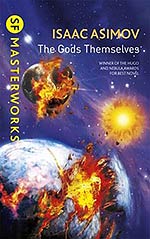
![]() jfrantz
jfrantz
8/13/2012
![]()
Separated into three different but parallel stories, The Gods Themselves begins when scientists have discovered a way to exchange energy with another universe, the para-universe. Things get dicey when what is at first possibly the single greatest scientific achievement in history, threatens to become a horror story as it is understood that not only the two universes exchanging energy, but also physical laws which could result in our sun going nova.
Eternal contemporaneity
Published in '72, winner in '73, this is another title that it seems difficult to separate from the public scientific discourse of its time. The early 70's marked the passage of some of the most monumental environmental protection regulations in American history. I saw The Gods Themselves very clearly drawing on the experience of environmental and consumer protection messages being hashed out on the national political stage. But before I've got you thinking this is a book about vast conspiracies and coordinated cover-ups, rest assured Asimov elevates his discussion to broader epistemological concerns and again draws on the sentiment of the times as he pulls in questions that, given the 1962 publishing of Thomas Kuhn's, The Structure of Scientific Revolutions, spoke to the very heart of the philosophy of science in his day.
Where Asimov approaches the masterful with The Gods Themselves, is not just the incorporation of some pretty elusive and theoretical subject matter, but in that he makes it genuinely fun and doesn't ever come off overly-intellectual or supercilious (not that Kuhn's thoughts on non-linear paradigm shifts and the role of subjectivity/objectivity in science aren't fun). Without much thought, this could be a pretty great weekend read, but a little more attention also turns up some steamy philosophizing too. Sure, Asimov touches on elements of Kuhn's Scientific Revolutions, but I also found The Gods Themselves was especially poignant in an age of vehement and politically motivated skepticism.
"Oh, it was turning sour anyway. It's lasted long enough. What bothers me more--much more--is that he violently refuses to accept your interpretation of the Pionizer experiments you ran after the surface observations."
"I told you the way it would be."
"He said he had seen your results."
"He glanced at them and grunted."
"It's rather disillusioning. Does everyone just believe what he wants to?"
"As long as possible. Sometimes longer."
Part 3 - Chapter 12
The Gods Themselves is also strikingly apropos of issues of privatization and commercialization science which have been in the news rather frequently of late. England recently decided to give the entire country access to its top science journal and the arguments for the free and open sharing of all information and media - including science - seem to be gaining in popular appeal.
"An odd thought. But perhaps it was that the fewer who knew of your Intuitionism, the fewer would suspect your contribution to what would otherwise be put to his sole credit."
Part 3 - Chapter 12
Asimov was also writing this just 10 years shy of the centennial of Henrik Ibsen's, Enemy of the People, which was published 90 years earlier in 1882. In fact, I read this as a great update (intentional or otherwise) to the classic which so accurately portends the future struggles to be faced by environmental and consumer advocates of the 60's and 70's, and really enjoyed pulling out those connections. There are characters who just don't want to believe the worst will happen. Those who refuse to believe the worst won't happen, and those who set out to prove the worst could happen. Then of course there are the spineless media and politicians. In Asimov's tale though, the scope has expanded by orders of magnitude. Instead of the threat of pollution that could ruin a growing town, Asimov has threatened the destruction of the world, the entire spiral arm of our galaxy to be exact. That the consequences couldn't possibly affect us in our lifetime is big here and Asimov very clearly has little respect for those willing to externalize such consequences.
Recommendation
Now having read every Hugo Award winner through 1979, this book felt very much a part of the genre. It is certainly not to say that The God's Themselves was derivative or overly referential, but it recalled this or that from a number of the earlier winners and as I mentioned above, of non-SF titles too, and the effect was something akin to a pleasant reminiscence. I liked a lot about this book but pulled-up short of seriously falling in love with anything. I haven't read much of Asimov, but this makes me want to read more.
http://hugoenduranceproject.blogspot.com/2012/08/the-gods-themselves.html